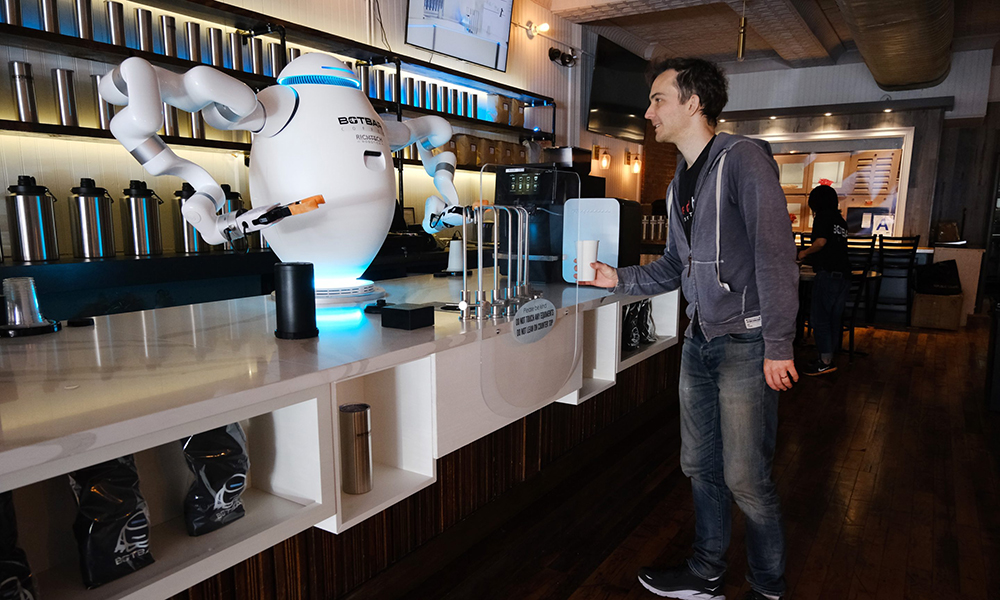
千禧一代和Z世代见证了对他们曾祖辈来说只存在于科幻小说中的科技进步,包括iPhone手机的诞生和自动驾驶汽车的面世,但A世代的境遇甚至可能更加超乎前人的想象。
由股票策略师马丁·布里格斯(Martyn Briggs)领导的美国银行研究(Bank of America Research)的分析师团队周二解释道,人工智能(AI)的崛起是“一个更具革新性的iPhone时刻”,在未来几十年内将不仅重塑商界和全球经济,还会改变整整一代人。
A世代一般是指2012年至2020年代中期出生的人口,他们将在这样一种“常态”中长大:AI助手与孩子一起学习和成长,并逐渐调整功能以适应他们的具体需求。
周四,布里格斯及其团队在一份报告中总结了最近14场AI专家活动的重要启示,并写道:“我们正处在‘A世代’人口变革的初期。作为出生于网络世界的第一代人,Z世代是目前最具颠覆性的一代;但今天的孩子们却将会在AI模型的陪伴下成长。”
分析师们引用了Alphabet旗下研究与开发机构X(原为GoogleX)的顾问蒂莫西•帕潘德里欧(Timothy Papandreou)的言论,他在不久前举办的一场活动中表示,随着孩子们在人生过程中学会使用生成式AI“助手”,AI将推动程序员一代向“最佳提示者”一代转变。
未来,A世代将不再需要掌握编程技能来使用他们的AI模型,而只需设法通过输入简单的文本来适当地提示这些系统,以获得理想的结果,无论是在为了完成学校论文而查找关于小说家卡夫卡的资料,还是书写工作邮件的时候。
帕潘德里欧表示,“如今,孩子们从出生起就会有一个AI虚拟随身助理或经纪人。在孩子们长大的过程中,AI也会随之成熟,掌握一切必要的信息,并且一直以导师的角色相伴他们左右”,并称Z世代将是“最后一代没有AI陪伴着长大的人”。
如《财富》杂志之前报道,作为生于互联网和社交媒体时代的第一代人,Z世代一直在忙着对抗焦虑和努力寻找自身的意义。如今,该轮到A世代应对科技快速发展的影响了,他们对AI的使用很可能将引起一系列新的、始料未及的心理健康问题。
企业与监管机构面对的新世界
美国银行(Bank of America)的分析师详细阐明了A世代对AI的使用最终将如何重塑商界以及为何需要政府的严格监管以防止最坏的情况发生。他们指出,年轻一代已经开始接受AI,并称“以ChatGPT和Bard为例,年轻一代更加了解它们,也以更为赞许的态度看待它们。”
在过去一年的14场AI活动上,接受美国银行采访的专家们表示:总之,作为精通AI的第一代人,A世代的崛起意味着企业亟需快速过渡到应用AI技术的阶段。
未来主义者、奇点大学(Singularity University)联合创始人彼得•迪曼蒂斯(Peter Diamandis)对该投资银行直言不讳道:“到这个十年结束时,将会有两种公司:一种是充分利用AI的公司,另一种是破产的公司。”
对政府来说,随着A世代日渐成熟,AI显现出巨大的风险。专家一再警告AI对劳动力市场构成潜在影响,但相比造成失业,美国银行的分析师更担心AI引发深度伪造、虚假宣传及侵犯版权和知识产权等问题。他们表示,未来将需要借助“AI管理员”(监督AI模型的人类程序员和监管者)来抵抗这些消极影响。
他们写道:“对AI实施监管的日子即将到来。为了解决利用AI进行虚假宣传和传播假新闻的问题,我们需要监管,尤其是要制定原则、标准以及搭建防护栏。”
美国银行还与AI伦理学家及欧洲负责任人工智能办公室(European Responsible Artificial Intelligence Office)主任内尔·沃森(Nell Watson)就未来法规将演变成怎样进行了探讨。后者表示,将“不大可能”形成全球性的AI监管框架,但旨在防止最坏情况的各种策略正陆续推出。
她解释道:“每个地区的目标都是进行‘恰到好处’的干预,但采取的办法各不相同,其中有监测和管控(中国)、国家安全限制/硬件限制(美国)以及实施隐私法(欧盟)。”
沃森说,“迄今为止,公司的AI道德意识和自我监管尚不足且水平参差不齐”,不过也不应该因为“道德恐慌”就过度监管新技术。
她表示:“我们的分寸应拿捏得当,做到确保足够的安全性以防止引发灾难性事件和不良的外部效应,但又不会完全阻碍AI的发展。”(财富中文网)
译者:中慧言-刘嘉欢
千禧一代和Z世代见证了对他们曾祖辈来说只存在于科幻小说中的科技进步,包括iPhone手机的诞生和自动驾驶汽车的面世,但A世代的境遇甚至可能更加超乎前人的想象。
由股票策略师马丁·布里格斯(Martyn Briggs)领导的美国银行研究(Bank of America Research)的分析师团队周二解释道,人工智能(AI)的崛起是“一个更具革新性的iPhone时刻”,在未来几十年内将不仅重塑商界和全球经济,还会改变整整一代人。
A世代一般是指2012年至2020年代中期出生的人口,他们将在这样一种“常态”中长大:AI助手与孩子一起学习和成长,并逐渐调整功能以适应他们的具体需求。
周四,布里格斯及其团队在一份报告中总结了最近14场AI专家活动的重要启示,并写道:“我们正处在‘A世代’人口变革的初期。作为出生于网络世界的第一代人,Z世代是目前最具颠覆性的一代;但今天的孩子们却将会在AI模型的陪伴下成长。”
分析师们引用了Alphabet旗下研究与开发机构X(原为GoogleX)的顾问蒂莫西•帕潘德里欧(Timothy Papandreou)的言论,他在不久前举办的一场活动中表示,随着孩子们在人生过程中学会使用生成式AI“助手”,AI将推动程序员一代向“最佳提示者”一代转变。
未来,A世代将不再需要掌握编程技能来使用他们的AI模型,而只需设法通过输入简单的文本来适当地提示这些系统,以获得理想的结果,无论是在为了完成学校论文而查找关于小说家卡夫卡的资料,还是书写工作邮件的时候。
帕潘德里欧表示,“如今,孩子们从出生起就会有一个AI虚拟随身助理或经纪人。在孩子们长大的过程中,AI也会随之成熟,掌握一切必要的信息,并且一直以导师的角色相伴他们左右”,并称Z世代将是“最后一代没有AI陪伴着长大的人”。
如《财富》杂志之前报道,作为生于互联网和社交媒体时代的第一代人,Z世代一直在忙着对抗焦虑和努力寻找自身的意义。如今,该轮到A世代应对科技快速发展的影响了,他们对AI的使用很可能将引起一系列新的、始料未及的心理健康问题。
企业与监管机构面对的新世界
美国银行(Bank of America)的分析师详细阐明了A世代对AI的使用最终将如何重塑商界以及为何需要政府的严格监管以防止最坏的情况发生。他们指出,年轻一代已经开始接受AI,并称“以ChatGPT和Bard为例,年轻一代更加了解它们,也以更为赞许的态度看待它们。”
在过去一年的14场AI活动上,接受美国银行采访的专家们表示:总之,作为精通AI的第一代人,A世代的崛起意味着企业亟需快速过渡到应用AI技术的阶段。
未来主义者、奇点大学(Singularity University)联合创始人彼得•迪曼蒂斯(Peter Diamandis)对该投资银行直言不讳道:“到这个十年结束时,将会有两种公司:一种是充分利用AI的公司,另一种是破产的公司。”
对政府来说,随着A世代日渐成熟,AI显现出巨大的风险。专家一再警告AI对劳动力市场构成潜在影响,但相比造成失业,美国银行的分析师更担心AI引发深度伪造、虚假宣传及侵犯版权和知识产权等问题。他们表示,未来将需要借助“AI管理员”(监督AI模型的人类程序员和监管者)来抵抗这些消极影响。
他们写道:“对AI实施监管的日子即将到来。为了解决利用AI进行虚假宣传和传播假新闻的问题,我们需要监管,尤其是要制定原则、标准以及搭建防护栏。”
美国银行还与AI伦理学家及欧洲负责任人工智能办公室(European Responsible Artificial Intelligence Office)主任内尔·沃森(Nell Watson)就未来法规将演变成怎样进行了探讨。后者表示,将“不大可能”形成全球性的AI监管框架,但旨在防止最坏情况的各种策略正陆续推出。
她解释道:“每个地区的目标都是进行‘恰到好处’的干预,但采取的办法各不相同,其中有监测和管控(中国)、国家安全限制/硬件限制(美国)以及实施隐私法(欧盟)。”
沃森说,“迄今为止,公司的AI道德意识和自我监管尚不足且水平参差不齐”,不过也不应该因为“道德恐慌”就过度监管新技术。
她表示:“我们的分寸应拿捏得当,做到确保足够的安全性以防止引发灾难性事件和不良的外部效应,但又不会完全阻碍AI的发展。”(财富中文网)
译者:中慧言-刘嘉欢
Millennials and Gen Z have witnessed technological advancements their great grandparents would have seen as science fiction, from the birth of the iPhone to the rollout of self-driving cars, but Gen A’s story might be even more Asimov-esque.
Bank of America Research analysts, led by equity strategist Martyn Briggs, explained Thursday that the rise of A.I. is “an iPhone moment, on steroids” that will reshape not only the business world and the global economy over the coming decades, but also an entire generation.
Gen A, generally defined as those born between 2012 and the mid-2020s, will grow up in a world where “the norm” will be A.I. assistants that learn and grow alongside children, slowly being tailored to their specific needs.
“We are at the dawn of a demographic ‘Gen A’ revolution,” Briggs and his team wrote in a Thursday note summarizing the key takeaways from 14 recent A.I. expert events. “While Gen Z is the most disruptive generation now as the first generation to be born into an online world; kids of today will have AI models that grow with them.”
The analysts cited Timothy Papandreou, an advisor to Alphabet’s research and development organization, X (formerly GoogleX), who explained at a recent event that A.I. will lead to a transition from a generation of programmers to a generation of “perfect prompters” as kids learn to utilize generative A.I. “assistants” throughout their lives.
Gen A won’t need programming skills to use their A.I models, instead they will work to properly prompt these systems with simple text to get the desired outcome, whether that’s finding information about Kafka for a school paper or writing an email at work.
“Children will now have an A.I. avatar shadow assistant or agent from birth. As they grow A.I. will grow with them and know everything it needs to know, and always be there as a mentor,” Papandreou said, arguing that Gen Z will be the “last generation to not grow up with AI.”
As Fortune previously reported, Gen Z has grappled with anxiety and finding meaning in their role as the first generation born with the internet and social media. Now, it’s Gen A’s turn to deal with the impact of rapid technological advancement, and their A.I. usage will likely bring forward a whole new set of unforeseen mental health problems.
A new world for businesses and regulators
Bank of America’s analysts detailed how Gen A’s use of A.I. will ultimately reshape the business world and require serious regulation from governments to prevent worst-case scenarios. They argued that younger generations are already leaning into A.I, noting that “in the case of ChatGPT and Bard, younger generations are more aware of them and see them in a more favourable light.”
In sum, the rise of the first A.I.-fluent generation, Gen A, means a rapid transition to using the technology is necessary for businesses, according to the experts BofA interviewed throughout 14 separate A.I. events over the past year.
“There will be two kinds of companies at the end of this decade: those that are fully utilizing AI, and those that are out of business,” Peter Diamandis, a futurist and the co-founder of Singularity University, bluntly told the investment bank.
For governments, the risks of A.I. are significant as Gen A comes of age. Experts have repeatedly warned about the potential impact of A.I. on the labor market, but BofA’s analysts are less concerned about job losses and more worried about the rise of deepfakes, propaganda, and copyright and intellectual property issues. They said there will need to be “AI Wranglers”—human programmers and regulators who oversee A.I. models—to help counteract these negative effects in the future.
“A.I. regulation is on the horizon,” they wrote. “To address the problems of propaganda and fake news, we need regulation, especially principles, standards and guardrails.”
BofA also spoke with Nell Watson, an A.I. ethicist and the president of the European Responsible Artificial Intelligence Office, about how future regulations might look. She said a global framework for regulating A.I. is “unlikely,” but different strategies to prevent worst-case scenarios are rolling out now.
“Each region is targeting a ‘Goldilocks level’ of just right intervention but taking different approaches, from surveillance and control (China), national security/hardware restrictions (US), to privacy laws (EU),” she explained.
Watson said that “company A.I. ethics and self-regulation are insufficient and uneven thus far,” but the new technology shouldn’t be overregulated due to “moral panic” either.
“We should do just enough and not more, to have enough safety to prevent catastrophe and prevent unfortunate externalities, but not shut down A.I. altogether,” she argued.






